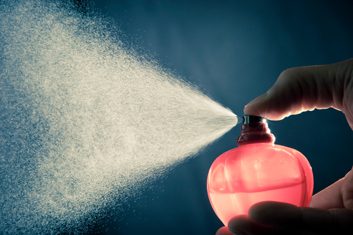The future of fragrance: Why are some ingredients being banned?
Ten natural ingredients are currently under review and could be banned from fragrance. Read on to find out if your signature scent might be impacted

Source: Best Health magazine, November/December 2014
Its rich, earthy aroma has made oak moss a prized ingredient among perfumers’the essential oil that is extracted from this moss has long been used by some perfumers as a base note and fixative. But a proposed European Commission ban means its traditional use in fragrances will soon be illegal. Oak moss is a type of fungal lichen found in North America and Europe; it grows on the trunk and branches of oak trees, and has reportedly been used in such legendary fragrances as Chanel No. 5, Miss Dior and Mitsouko. At issue are two molecules in oak moss and tree moss’atronol and chloroatronol’that may cause an allergic skin reaction called dermatitis in the one to three percent of the European Union population who have fragrance allergies. ‘Given the health risk, we will follow the independent scientific advice,’ David Hudson, the Brussels-based spokesperson for consumer policy at the European Commission, told Best Health. The ban is expected to pass and take effect in early 2015.
Nine other natural substances commonly used in fine fragrances are also being examined by industry regulators because they are considered potential allergens. These include isoeugenol (which is found in ylang-ylang) and eugenol (found in cinnamon). Plus, linalool, found in lavender, and citrus materials such as bergamot are under the microscope. ‘Citrus materials that contain any of the nine substances, or that oxidize on the skin, are considered potential allergens,’ says Stephen Weller, the Brussels-based director of communications for the International Fragrance Association (IFRA), which represents the fragrance industry worldwide. He says the European Union is considering further study to develop an agreed methodology for assessing fragrance materials for allergens, in line with IFRA’s standards, rather than banning them outright.
How does this affect fragrance lovers? Some in the industry say, ‘plus ça change,’ pointing out that perfume ingredients are constantly evolving. François Duquesne, CEO and co-founder of the online company Fragrance Republic, notes that reformulated scents tend to be ‘surprisingly close’ to the original. ‘Perfumers have always been busy updating formulas to either make them comply with new restrictions or evolve with consumer tastes,’ says Duquesne, who is based in New York City and Paris. ‘This is a normal process in our industry.’ Perfumers may use a molecularly altered version of the material, substitute a synthetic version, or use alternative natural ingredients such as patchouli.
Still, tweaks to fragrance formulations can stir strong emotions among perfume devotees. ‘Nobody notices it more than a woman who has been wearing a fragrance for several years, because she’s the best expert on it,‘ says Denyse Beaulieu, a Canadian fragrance writer who is based in Paris. ‘She has lived in it.’
Rumour has it, says Beaulieu, that letters of complaint have been sent to perfume company Guerlain regarding Shalimar, the famous oriental fragrance created in 1925. Shalimar has undergone a few reformulations, particularly since the 1990s when IFRA standards became more stringent.
A consumer may find the integrity of the formula is compromised when ingredients change. Says Marian Bendeth, a global fragrance expert and owner of consulting company Sixth Scents: ‘Fragrance and flavour houses say they can make an aroma chemical to emulate oak moss, but it’s nowhere close to the same as the original natural oil in depth, texture and tenacity.’ Oak moss is one of the defining parts of the family of perfumes known as chypre, she says. Patchouli, which is now being included in the newer chypre families, has very different characteristics. ‘Oak moss is the defining smoothness of a chypre.’
Changes in iconic fragrances understandably spark debate; as for the future of perfume, though, one has to imagine that, with all the innovation behind the creation of new ingredients, the ‘next’ new bottle is out there’ready to surprise and seduce you.




